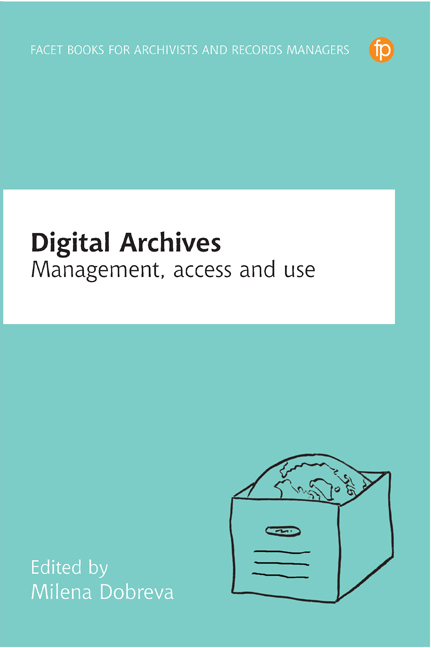Book contents
- Frontmatter
- Dedication
- Contents
- List of Figures and Tables
- Abbreviations
- Foreword
- Preface: Digital archives: management, use and access participatory approaches in archives
- Acknowledgements
- Notes on contributors
- PART I DRIVERS FOR MODERN DIGITAL ARCHIVES
- 1 Digital humanities and documentary mediations in the digital age
- 2 Managing turbulence
- 3 The political economy of digital cultural preservation
- 4 Legal issues surrounding digital archiving
- 5 Scientific information policies in the European context
- 6 Access to digital archives: studying users' expectations and behaviours
- PART II CASE STUDIES
- Afterword
- Index
4 - Legal issues surrounding digital archiving
from PART I - DRIVERS FOR MODERN DIGITAL ARCHIVES
Published online by Cambridge University Press: 02 October 2019
- Frontmatter
- Dedication
- Contents
- List of Figures and Tables
- Abbreviations
- Foreword
- Preface: Digital archives: management, use and access participatory approaches in archives
- Acknowledgements
- Notes on contributors
- PART I DRIVERS FOR MODERN DIGITAL ARCHIVES
- 1 Digital humanities and documentary mediations in the digital age
- 2 Managing turbulence
- 3 The political economy of digital cultural preservation
- 4 Legal issues surrounding digital archiving
- 5 Scientific information policies in the European context
- 6 Access to digital archives: studying users' expectations and behaviours
- PART II CASE STUDIES
- Afterword
- Index
Summary
Background
Archiving is as old as recorded knowledge. As soon as man had more than one clay tablet, papyrus or parchment scroll stored at one place, the archive was born. Over the centuries that followed, a plethora of rules were developed regarding ownership, acquisition, appraisal, arrangement, use, preservation, management and access to the collections of documents we now call ‘archives’. Gradually, those rules gained more and more legal character – they were created or sanctioned by the state and enforced by the government.
Governments take interest in archives for many reasons, the most important of which is control: the government wants to know who owns what, how much money in taxes can be collected, what resources can be allocated to particular public policies, and so on. This explains why property, corporate and shareholder registries exist, why taxpayers are obligated to preserve their accounting books, and why government agencies and private companies are required to keep records of their activities.
Individuals and companies are equally interested in retaining documents for future use. In order to turn to the government for protection of their interests, natural and legal persons have to demonstrate that they are entitled to certain legal rights. In most cases, the only way to do that is to produce a document, such as a birth certificate, a driving licence, a diploma, a ticket, a visa, a membership card, a contract, an invoice or a receipt. Besides the uses of archives to support governmental or business functions, there are currently also archives of historical documents, which are used mostly for research and teaching. These archives expand digital access to their holdings. Such activities also touch on a number of legal issues ranging from the rights invoked by sharing content to specific conditions of access. In today's world of interconnected computers, storing and examining tangible originals of documents, such as those mentioned above, is no longer necessary in many cases. The same applies to the objects of art, even three-dimensional ones. Preserving and consulting digital representations of those objects is usually enough, so property rights remain relevant only in a limited number of scenarios, when physical access to the artefact is needed.
- Type
- Chapter
- Information
- Digital ArchivesManagement, use and access, pp. 73 - 96Publisher: FacetPrint publication year: 2018



